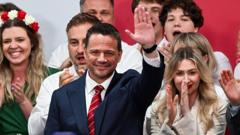Trzaskowski, the liberal mayor of Warsaw, addressed a jubilant crowd of supporters, saying, “We won," but noted the closeness of the race with a nod to “razor's edge” politics that may define Poland's future. He pledged to unite voters and stressed, "I will be a president for all Polish women and men." On the other hand, Nawrocki, buoyed by his supporters, urged them not to despair: “Let’s not lose hope... I believe we will wake up tomorrow with President Karol Nawrocki.”
The presidential office is largely symbolic, with limited powers, including the capacity to veto legislation. Currently, the conservative incumbent president, Andrzej Duda, has stymied Prime Minister Donald Tusk's efforts to execute key campaign promises. A confirmed victory for Trzaskowski would bolster Tusk’s agenda and enhance Poland's standing within the European Union, countering any legislative roadblocks obstructed by a conservative presidency.
In contrast, a victory for Nawrocki would not only reignite his party's ambitions but also maintain the ongoing confrontations between government and presidency. Both candidates, while advocating for continued support of Ukraine, differ on more expansive integration within the NATO alliance and EU.
Trzaskowski draws support from a younger, cosmopolitan demographic that is generally more pro-EU, while Nawrocki appeals to traditional voters resistant to ceding more authority to Brussels. As the competition continues, both candidates are bracing for the fallout of their campaigns, marked by allegations and character challenges that might sway voter sentiments.
As the nation awaits official results, the political landscape of Poland is hanging by a thread, with both supporters and critics keeping a close watch on tomorrow's developments.
The presidential office is largely symbolic, with limited powers, including the capacity to veto legislation. Currently, the conservative incumbent president, Andrzej Duda, has stymied Prime Minister Donald Tusk's efforts to execute key campaign promises. A confirmed victory for Trzaskowski would bolster Tusk’s agenda and enhance Poland's standing within the European Union, countering any legislative roadblocks obstructed by a conservative presidency.
In contrast, a victory for Nawrocki would not only reignite his party's ambitions but also maintain the ongoing confrontations between government and presidency. Both candidates, while advocating for continued support of Ukraine, differ on more expansive integration within the NATO alliance and EU.
Trzaskowski draws support from a younger, cosmopolitan demographic that is generally more pro-EU, while Nawrocki appeals to traditional voters resistant to ceding more authority to Brussels. As the competition continues, both candidates are bracing for the fallout of their campaigns, marked by allegations and character challenges that might sway voter sentiments.
As the nation awaits official results, the political landscape of Poland is hanging by a thread, with both supporters and critics keeping a close watch on tomorrow's developments.

















